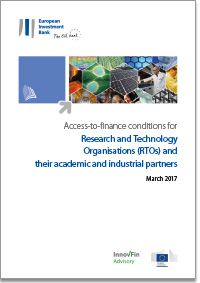
Description
The study reviews access-to-finance conditions met by Europe’s Research and Technology Organisations (RTOs) and proposes potential solutions to improve them. RTOs play a pivotal role in the European business landscape. They bring together individuals from across the innovation chain, providing a dynamic and essential connection between research and industry. RTOs and their partners face very specific challenges in obtaining the necessary funds for infrastructure development (e.g. test facilities and equipment) and for spin-out/special purpose vehicle (SPV) creation.
As the future availability of grants (especially for core funding) is becoming increasingly uncertain, new opportunities and sources of (repayable) financing are becoming available to the RTO community. These sources span from debt to quasi-equity and equity financial instruments, and include products such as Venture Capital and Technology Transfer Funds. Although grants will remain important in the overall financing mix of RTOs, the changing context can help to use them even “smarter”, i.e. even further, for the financing of non-commercially viable activities, and leverage them even better towards the attraction of complementary sources of return-based financing.
The study shows that for some RTOs existing business models could be further optimised and complemented in order to reposition part of the current activities and, where possible, introduce a more commercial and market-driven perspective. It is demonstrated that financial knowledge and technological understanding are important and should be further leveraged in the innovation ecosystem. First, not all RTOs may have the necessary knowledge of project and financial structuring. Second, financial players should be supported by bringing technological know-how into the financial and due-diligence process. RTOs could play a role in providing this know-how and as such develop new services and associated streams of income.
The report provides specific recommendations on how the RTOs can close the identified funding gaps and discusses how existing and potentially new EIB-EC financial instruments and advisory services can be instrumental herein.
The study was carried out by InnovFin Advisory.

